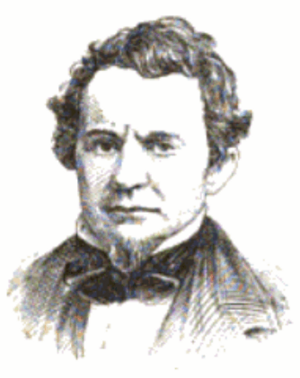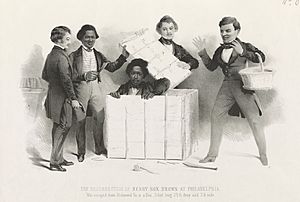James Miller McKim facts for kids
Quick facts for kids
James Miller McKim
|
|
|---|---|
 |
|
| Born | November 10, 1810 Carlisle, Pennsylvania
|
| Died | June 13, 1874 (aged 63) West Orange, New Jersey
|
| Education |
|
| Occupation | Clergyman |
| Spouse(s) |
Sarah Allibone Speakman
(m. 1840) |
| Children | Charles Follen McKim Lucy McKim Garrison |
| Signature | |
James Miller McKim (born November 10, 1810 – died June 13, 1874) was an American Presbyterian minister. He was also a strong abolitionist, meaning he worked to end slavery. He was the father of famous architect Charles Follen McKim.
Contents
Early Life and Fight Against Slavery
James Miller McKim was born in Carlisle, Pennsylvania. He went to college at Dickinson College and Princeton. In 1835, he became a pastor at a Presbyterian church in Womelsdorf, Pennsylvania.
A few years before, he read a book by William Lloyd Garrison that made him believe slavery was wrong. He decided to become an abolitionist. He joined the group that started the American Anti-Slavery Society.
In October 1836, he left his church job to speak out against slavery. He gave speeches all over Pennsylvania. In 1840, he moved to Philadelphia to work for the Pennsylvania Anti-Slavery Society. He helped organize events and wrote letters for the group. That same year, he married Sarah Allibone Speakman. He also sometimes edited a newspaper called the Pennsylvania Freeman.
Helping Escaped Slaves
In 1849, James McKim was part of an amazing event. A brave enslaved man named Henry Box Brown escaped from Richmond, Virginia. He mailed himself to freedom in a small shipping box! Henry arrived in Philadelphia, and McKim was there to help him.
An artist named Samuel W. Rowse drew a picture of Henry Box Brown coming out of the box. This picture was used to help raise money for the Underground Railroad. The Underground Railroad was a secret network that helped enslaved people escape to freedom.
McKim often helped with cases involving the Underground Railroad. He worked on many slave cases in court, especially after the Fugitive Slave Act of 1850 was passed. This law made it harder for enslaved people to escape.
Supporting John Brown's Family
In 1859, Reverend McKim and his wife Sarah helped John Brown's wife, Mary Brown. John Brown was an abolitionist who tried to start a slave rebellion at Harpers Ferry, West Virginia. His plan failed.
The McKims went with Mary Brown to Virginia to visit her husband in jail. They stayed in Harpers Ferry until John Brown was executed on December 2, 1859. The McKims prayed with Mary Brown until the time of his execution passed.
Afterward, they helped Mary Brown get John Brown's body. McKim then traveled with her to his burial place. This was the John Brown Farm State Historic Site in a remote area of North Elba, New York.
Helping During and After the Civil War
In the winter of 1862, after the capture of Port Royal, South Carolina, many enslaved people were suddenly freed. McKim helped organize a meeting in Philadelphia to help these 10,000 newly freed people. This meeting led to the creation of the Philadelphia Port Royal Relief Committee.
McKim also strongly supported allowing African American men to join the army. He helped create Camp William Penn, a training camp for United States Colored Troops. This camp helped recruit eleven regiments of African American soldiers.
In November 1863, the Port Royal Relief Committee grew into the Pennsylvania Freedman's Relief Association. McKim became its secretary. As the American Civil War continued, and after President Lincoln announced the Emancipation Proclamation in 1863, McKim joined the Freedmen's Aid Commission. He worked hard to help the newly freed people.
After the war, he traveled a lot to set up schools in the South. In 1865, he joined the American Freedman's Union Commission. This group worked to provide fair education for everyone in the South. In July 1869, the commission decided to stop its work, as they felt they had done all they could.
Later Life and Legacy
McKim's health became poor, and he retired from public life. In 1865, he helped start a newspaper in New York called The Nation. He saw this newspaper as a way to continue the important work of the abolitionist movement.
James Miller McKim passed away in West Orange, New Jersey on June 13, 1874.
 | Madam C. J. Walker |
 | Janet Emerson Bashen |
 | Annie Turnbo Malone |
 | Maggie L. Walker |


